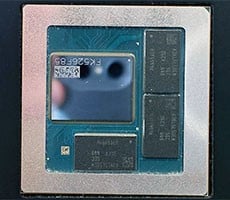AMD Ryzen 9 3900X And Ryzen 7 3700X Review: Zen 2 Impresses
Phison worked closely with AMD to have a first-gen PCIe Gen 4 SSD controller ready in time for the Ryzen 3000 series launch, and an array of partners have already announced drives that will use it. The Phison PS5016-E16 SSD controller will be at the heart of a number of new NVMe SSDs that boast sequential read transfer speeds of up to 5GB/s, and writes of up to 4.4GB/s. That’s a fair bit beefier than today’s faster PCIe 3.0 x4 NVMe SSDs, which can hit about 3.5GB/s (reads) and 2.8GB/s (writes).
The Gigabyte Aorus NVMe Gen4 SSD pairs the PCIe 4x4 Phison PS5016-E16 with some of Toshiba’s latest BiCS4 NAND flash memory and SK Hynix DRAM. The drive’s rated specifications are right in-line with Phison’s performance claims, and Gigabyte also throws in a heavy-duty, removable copper heatsink with LAIRD high-conductivity thermal pad.
The Gigabyte Aorus NVMe Gen4 SSD leverages the common M.2 2280 form factor and Gigabyte will offer the drive in capacities ranging from 500GB on up to 2TB.










